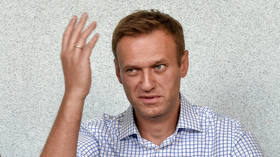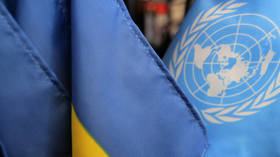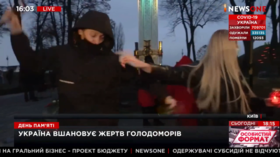Opposition figure Navalny could face investigation for calling for ‘violent overthrow’ of Putin’s government

Authorities in Moscow could open a new file on opposition activist Alexey Navalny after he made a series of statements earlier this year that, they say, condone extremism against the Russian state.
The TASS news agency on Tuesday reported that a source within Russian law enforcement confirmed that investigators were assessing whether Navalny’s interview on the Echo Moscow radio station in April has broken laws around incitement to violence. Owned by Gazprom media, Echo is a liberal-leaning outlet edited by veteran journalist Alexey Venediktov.
During the show, Navalny outlined his “five steps for Russia” and criticized the government’s handling of food poverty during the coronavirus pandemic, which had just begun in Russia. If, he said, “they want to leave 60 million people to go hungry, that power should definitely be overthrown right away – quite possibly even violently.”
The source added that “in connection with these statements, on November 30, an investigation was begun for evidence of public calls for extremist activity, in line with part Two of article. 280 of the Criminal Code of the Russian Federation.”
On Tuesday afternoon, a spokeswoman for the Investigative Committee told journalists that the federal agency was not behind the inquiry, as was reported by some outlets. However, sources within the Moscow City's police told RT their division is assessing whether Navalny's comments were against the law. The status of the inquiry is yet to be made public.
Navalny has a track record of making provocative, even violent statements, having previously appeared in a pro-gun-ownership video (2007) in which he advocated the use of a pistol to “deal with” people implied to be terrorists from Russia’s majority-Muslim Caucasus regions. In the clip, he acted out shooting an armed woman wearing a hijab.
The activist has been in Germany since being hospitalized there in August, after what his supporters allege was a state-sponsored poisoning. The Kremlin strongly denies any involvement in his illness, and has questioned the opposition figure’s version of events. In October, Russian President Vladimir Putin told reporters that he had personally “intervened” to enable Navalny to be transferred from an intensive care unit in the Siberian city of Omsk to Berlin’s Charite hospital.
The incident has led to a deterioration in relations between Moscow and politicians in Germany, who have since driven forward a package of sanctions and punitive measures against those they claim were responsible.
Like this story? Share it with a friend!















